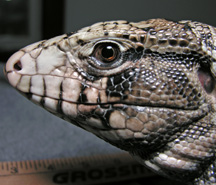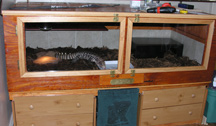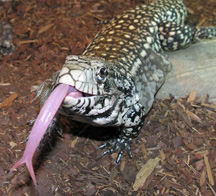Argentine Black & White Tegus
Tupinambis merianae
 Argentine Black & White Tegus can make excellent "dog-tame" pets provided you have plenty of room for them and can afford to feed them what amounts to "a lot" of food.
Argentine Black & White Tegus can make excellent "dog-tame" pets provided you have plenty of room for them and can afford to feed them what amounts to "a lot" of food.
Tegus get BIG and they get big FAST. This fact should not be overlooked when you fall in love with that tiny hatchling at the pet store or reptile expo. By big we mean 4-5 feet long and up to 15 pounds.
This page is only meant to be a jumping off point. There are many great care sheets (see links below) out there already. Here are some of the major points regarding Black & White Tegus:
Why a Tegu?
I got Jasper at the Dayona Expo in August 2007 from Royal Reptilia. He was bred by Bobby Hill of Varnyard Herps. Everyone was saying how cool and tame Argentine Black & Whites are. Man, were they right. Jasper is certainly one of the most interesting and laid back of all my lizards. Dog tame? Why yes, yes he is! I was completely unprepared for the rapid growth rate, however. We found ourselves throwing away a couch to make room for a giant tegu cage. Cool, yes. But I cannot stress the "they get really big really fast part" either. BE PREPARED! Check out the video that makes everyone want a tegu at Sisco Reptiles.
Just what do Tegus eat?
Tegus are mainly carnivores but will take some fruit in their diet. They need a variety of meat items including frozen, thawed mice (soon to be rats), ground turkey (with bone meal added), chicken gizzards, fish such as tilapia or smelts, chicken or beef liver, beef heart, chicks, quail, eggs, etc. Insects such as crickets, superworms, mealworms, and roaches are also relished; particularly by hatchlings and juveniles. Variety is key. Many people believe in feeding only rodents but I think a bit more variety is needed. Some tegus readily eat the fruit portion of the diet. Jasper is not one of these tegus so I play "hide the fruit" on a daily basis. I make ground turkey balls filled with various fruits including but not limited to blueberries, raspberries, strawberries, papaya, mango, pear, apple etc. He wolfs it down like plain old turkey.
How much space do they need?
 As mentioned above Tegus get big FAST! Keep this in mind when shopping for a hatchling. While a 20-40 gallon tank might suffice for a couple of months you will want to start planning for a custom cage that is no less than 6 feet long by 3 feet deep and 2 feet high (6x3 cage pictured at left.) Most people recommend 8x4x2.5 but I feel if you get your tegu out for exercise on a regular basis you can get away with a 6x3 foot cage. Please don't think you can get away with keeping an adult tegu in an aquarium of any sort. Even the largest aquariums are 2 feet deep at most. Jasper was over 3 feet long at 6 months old to give you some idea of the growth rate. Check out photos of our cage-building project.
As mentioned above Tegus get big FAST! Keep this in mind when shopping for a hatchling. While a 20-40 gallon tank might suffice for a couple of months you will want to start planning for a custom cage that is no less than 6 feet long by 3 feet deep and 2 feet high (6x3 cage pictured at left.) Most people recommend 8x4x2.5 but I feel if you get your tegu out for exercise on a regular basis you can get away with a 6x3 foot cage. Please don't think you can get away with keeping an adult tegu in an aquarium of any sort. Even the largest aquariums are 2 feet deep at most. Jasper was over 3 feet long at 6 months old to give you some idea of the growth rate. Check out photos of our cage-building project.
What about temperatures?
Surprisingly, Argentine Black & White Tegus come from Argentina where it is hot in the summer and cold in the winter. Tegus in captivity need a basking spot of about 100-110 degrees during the spring and summer. The rest of the cage should be in the 80s during the day and at night the temperatures can drop safely into the low 70s. A winter cooldown period is recommended as these guys hibernate in their native country. Most tegus will choose to hibernate starting in September regardless of temperatures.
Do I have to worry about humidity?
Yes, a high level of humidity is crucial to keeping Tegus healthy. Strive for at least 60% if not higher. Keeping them on cypress mulch is helpful as it can be kept damp, not wet. To keep humidity in the cage you might have to cover part of the top of the cage. When constructing a custom cage for an adult keep these high humidity requirements in mind and make sure there is ventilation but not so much as to let all the humidity out.
Substrate
 And here we come to one of the most highly contested subjects in herp care. Substrates. I choose to use cypress mulch as it holds humidity well (see above.) It also lets them burrow as is their nature. Some people might be concerned about ingestion of the substrate. I don't worry too much about that for larger tegus as I feed from a dish. When feeding babies and juveniles insects you will want to feed them in a separate feeding container (such as a rubbermaid/sterilite tub) so they dont gulp down the mulch along with their prey. While you could use something "safer" such as newspaper I think the animal would suffer from not being able to dig and burrow.
And here we come to one of the most highly contested subjects in herp care. Substrates. I choose to use cypress mulch as it holds humidity well (see above.) It also lets them burrow as is their nature. Some people might be concerned about ingestion of the substrate. I don't worry too much about that for larger tegus as I feed from a dish. When feeding babies and juveniles insects you will want to feed them in a separate feeding container (such as a rubbermaid/sterilite tub) so they dont gulp down the mulch along with their prey. While you could use something "safer" such as newspaper I think the animal would suffer from not being able to dig and burrow.
Do Tegus really need UV lighting?
Yes, I believe they need UV lighting like all other basking lizards. If you can put your tegu outside all summer long then you don't have to worry because they get all they need from the sun. Most of us can't get their tegus out all summer so we have to use UV lights such as the Zoo-Med Reptisun 10.0 fluorescent tubes or mercury vapor lamps such as the Zoo-Med Powersun or Megaray Bulbs. See my UVB Page for more information on UV in general.
Supplementation
When supplementing all my animals I don't follow any strict regimen. I use straight calcium a lot as it cannot be overdosed. I use calcium with D3 about 1-2x per week, if that (D3 is toxic in large amounts) and vitamin/mineral supplements periodically. For vitamins I like Rep-Cal's Herptivite and for mineral supplementation I like Minerall. I think that with a balanced diet you should not have to supplement much at all. Gutload the insects, feed high quality rodents and sneak the fruit in there and you should be all set.
Links to Tegu Care Sheets
Where should I get a Black & White Tegu?
- Sisco Reptiles - Rick breeds some really nice animals. He is located in Maine.
- Varnyard Herps - Home of the Dog Tame Tegu. Located in Florida.
- Royal Reptilia - Limey is in NY. Usually has some Varnyard Stock.
© 2008, www.reptilecare.com. All rights reserved.

